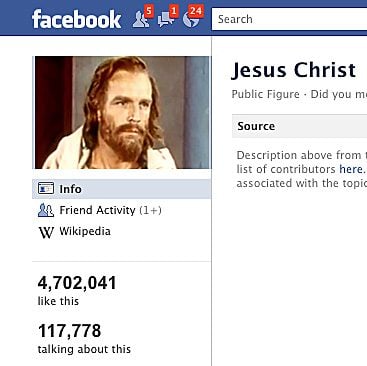Would Jesus Have a Facebook Page?
by Dr. Mark D. Roberts
Copyright © 2012 by Mark D. Roberts and Patheos.com
Note: You may download this resource at no cost, for personal use or for use in a Christian ministry, as long as you are not publishing it for sale. All I ask is that you acknowledge the source of this material: http://www.patheos.com/blogs/markdroberts/. For all other uses, please contact me at [email protected]. Thank you.
Would Jesus Have a Facebook Page?
If Jesus were on earth today, would he have a Facebook page?
No, says Drew Goodmanson, CEO of Monk Development, a company that helps churches use the Internet to fulfill their missions. In a USA Today article by Cathy Lynn Grossman, Goodmanson appreciates the fact that “you can have a digital Bible in the palm of your hand or connect with others in prayer any time anywhere.” But he goes on to say, “Jesus would not have a Facebook page. He wouldn’t be stopping in an Internet café to update his status.”

This makes me wonder:
Would Jesus have a Facebook page?
If Jesus would not have a Facebook page, why is it okay for his followers to have Facebook pages?
If Jesus would not have a Facebook page, why is it okay for Goodmanson, who is a follower of Jesus, to make a living by helping churches and other Christian organizations have Facebook pages? Is he helping Christians to do what Jesus would not do?
What historical or theological evidence should we consider if we’re trying to figure out whether or not Jesus would have a Facebook page?
What do you think? Would Jesus have a Facebook page? Why? Or why not?
(And if he did, what photo would he use? And how many friends would he have?)
Would Jesus Have a Facebook Page? Yes . . .
In one of yesterday’s posts, I asked the question: Would Jesus have a Facebook page? I was moved to ask this question by a statement in a USA Today article on technology in the church. In this article, Drew Goodmanson, the CEO of a company that helps Christian organizations use the Internet in their ministries, confidently said that Jesus would not have a Facebook page. This got me thinking. If Jesus were on earth today, would he really have a Facebook page? If so, why? If not, why not?
In typical fashion, my answer to “Would Jesus have a Facebook page?” is “Yes . . . and no.” Remember, I spent a good chunk of my life in academia, where simple answers are rare. But, more to the point, I believe there are good reasons for believing that today’s Jesus would have a Facebook page, even as there are good reasons for believing that he would not. Today, I’ll focus on some reasons why Jesus would have a Facebook page.
Jesus’ Communication Strategy in Cultural Context

When I picture Jesus communicating with people, my imagination is fueled by the films I saw in Sunday school. The Anglo-Saxon Son of God is dressed in clean Bible-land robes and dustless sandals, with long brown hair and an impressive beard. He speaks in hallowed tones to small groups of people in the countryside or small villages. Surely, this Jesus would not have a Facebook page even if he were on earth today. No, he’d be dressed like, well, Jesus, and speak in hallowed tones to folk who lived in the country.
Yet, when I put aside my childish views of Jesus and think about his ministry, I’m struck by how he communicated in the modes of his day. Jesus told stories, gripping stories, in fact. He engaged in theological dialogue. He provided dramatic illustrations of his teaching in the form of miracles and even exorcisms. Unlike many of the rabbis and popular philosophers of his day, Jesus didn’t sit back and wait for people to come to him. Rather, he spoke to people where they were, both literally and figuratively.
When I take this Jesus and plop him down in 2012, it seems at least possible if not likely that Jesus would communicate in the modes of our culture. Would this include Facebook? Perhaps. Twitter? Maybe. We should expect Jesus to use the means of communication available to him, unless these means were somehow intrinsically opposed to his message. (I’ll consider this possibility in my next post on this topic. However, if it is clear that Jesus would not have a Facebook page for theological or strategic reasons, then it seems reasonable to conclude that his followers shouldn’t either.)
Jesus as the Incarnation of the Word of God
Christians believe that Jesus was far more than simply a “good teacher.” We confess that he was (and is) the very Word of God made flesh. We affirm that, in Jesus, God entered into human life fully, though without sinning. Thus, from a theological point of view, if Jesus were to be incarnate in 2012, he would be fully engaged in this life. This suggests, it seems to me, that Jesus would be fluent in the language of the Internet, that he would have a Facebook page, and maybe even a blog.
Now I freely admit that this seems strange, even counter-intuitive, because I think of Jesus so much in terms of his own culture. He was the Word Incarnate in first-century Galilean Jewish culture. Yet, if Jesus were to show up today, I doubt he’d be wearing a costume from the annual Christmas pageant. He’d be dressed like any other 30-year-old in today’s culture (whatever that means!). And, given his mission to communicate and connect with people, I expect he would do this through the means of social media.
Unless, of course, there is something intrinsically sinful about social media, something that would be so inconsistent with the message and ministry of Jesus that he intentionally rejected it. I’ll consider this possibility in the next post in this series.
Would Jesus Have a Facebook Page? No . . .
Facebook Is Too Impersonal
 One of the commenters on yesterday’s blog post wrote: “He would not have a Facebook account. He is interested in intimate personal relationships and you can’t do that using the internet.” This is a good point. From what we see in the Gospels, Jesus did not communicate impersonally. He did not send edicts or even letters, as far as we know. He did at times speak to large groups, but most of his interactions were with relatively small groups or one-on-one. It’s hard to imagine Jesus having hundreds or thousands of casual “friends” on Facebook, or investing himself in the way of relating that is common in this medium.
One of the commenters on yesterday’s blog post wrote: “He would not have a Facebook account. He is interested in intimate personal relationships and you can’t do that using the internet.” This is a good point. From what we see in the Gospels, Jesus did not communicate impersonally. He did not send edicts or even letters, as far as we know. He did at times speak to large groups, but most of his interactions were with relatively small groups or one-on-one. It’s hard to imagine Jesus having hundreds or thousands of casual “friends” on Facebook, or investing himself in the way of relating that is common in this medium.
Moreover, in many ways, Facebook encourages triviality, inauthenticity, and a kind of exhibitionism. Most Facebook users are not sharing their true selves on Facebook. They are creating online personalities, masks that cover their true selves. Facebook friendships are not really friendships in any classic of deep sense of the word.
Having said this, I suppose a lot depends on how one views Facebook relationships. For me, Facebook is mainly a way to remain in contact with people with whom I already have intimate, personal relationships. I keep in touch with family and close friends whom I don’t see often because we don’t live close together. Yes, I have many “friends” whom I don’t know outside of Facebook, but I don’t think of them as the main reason I have a Facebook page. So, one could argue that Facebook has the potential to make intimate relationships even deeper, or, at any rate, more consistent. If this is true, then we might need to reconsider whether or not Jesus would have a Facebook page. Perhaps he’d use it to keep in touch with his mother.
Part of what makes it hard to imagine Jesus with a Facebook page is that so much of Facebook chatter is trivial, and we don’t think of Jesus as engaging in small talk. Unfortunately, we don’t have a record of his conversations when he hung out with “sinners” at their dinner parties. We know that they invited him and he frequently dined with them. Did he tell funny stories? Did he talk about the weather? Did he add witty comments when his host said something silly? Did he laugh out loud? I expect all of these are true. But, I must confess, I have a hard time actually envisioning Jesus doing these things. Still, much of Facebook falls into the “wasting time” category of life. Let’s admit it. I expect Jesus would have more important things to do with his time than many who invest their lives in Facebook.
Jesus Wouldn’t Use Facebook Because Digital Technology Is Essentially Dehumanizing
I have good friends who would argue that Jesus would not have a Facebook page because Facebook and the whole world of digital media is essentially dehumanizing. There is an inherent and inescapable difference between relating with someone face-to-face and relating to someone via Facebook. Friendship in three-dimensions is real in a way that can not be matched by digital friendship. The more our relationships are shaped by the norm of digital media, the less we are enjoying the fullness of our humanity.
I am not fully convinced by my friends who take this point of view, though I think they make a point we ought to consider seriously. It does impress me that we are letting technology radically reframe the way we relate to others, for better, perhaps, but certainly for worse. For example, next time you’re out at a restaurant, look around at other tables . . . or maybe even your own. You will see people interacting with technology rather than each other. People will be texting their non-present friends rather than having conversation with the real human beings sitting right across from them. It is hard to imagine Jesus updating his status while reclining at table with the dinner partners he is ignoring because he’s wrapped up in Facebook.
Jesus Would Not Use Facebook Because He Would Focus on a Few, Just as He Did in the First Century
It’s not uncommon to hear Christian defenders of Facebook argue that, of course, Jesus would have a Facebook page, because through this medium he could communicate with thousands or even millions of people. This argument forgets that Jesus, when he was here in the flesh, was not interested in communicating with the world. Rather, he focused his efforts mainly on relating to a few, to his closest disciples. Into these people, Jesus poured himself in a deeply personal way. Moreover, he did not make an effort to spread the good news of the kingdom of God beyond the Jewish people. This task would be given to his followers after Jesus’ death, resurrection, and ascension.
So, if Jesus were on earth today for the first time, he would not be interested in communicating with thousands or millions of people by way of Facebook. Rather, it’s safe to assume that he would be doing much as he did in the first-century, building deep, genuine, face-to-face relationships with a relatively small number of his closest followers. In time, these followers would spread the truth about Jesus throughout the world, perhaps even using Facebook.
I’m quite sure there are other reasons to believe that Jesus would not have a Facebook page if he were on earth today. Please share your thoughts in the comments.
In my next post in this series, I’ll try to draw together my thoughts and resolve some apparent contradictions.
